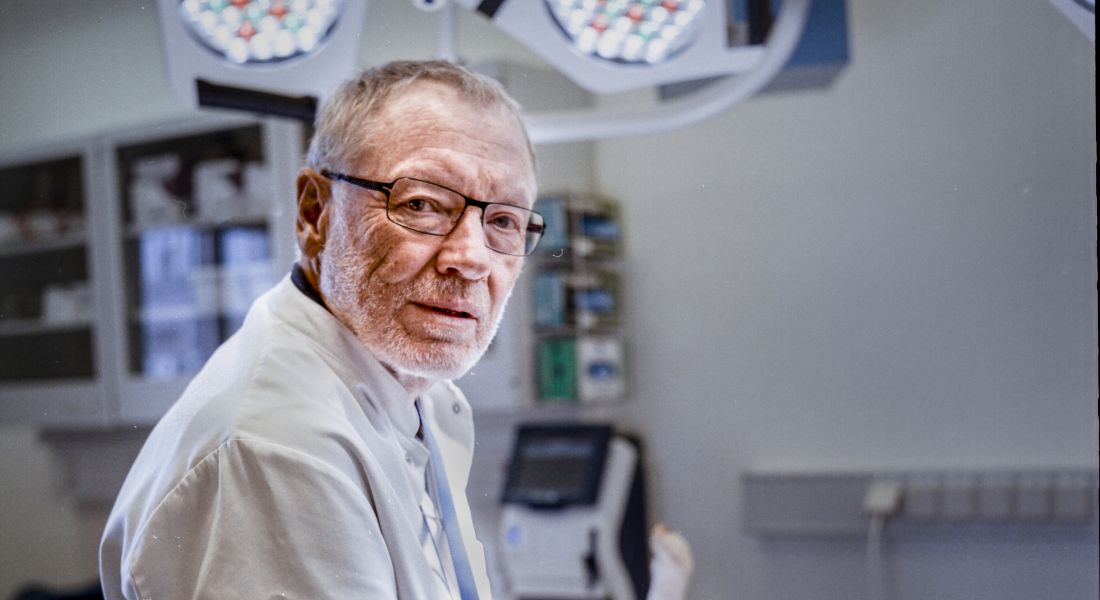Throughout a long career, Professor Jens Juul Holst has made discoveries that have strongly influenced how people with obesity or type 2 diabetes are treated today. Now he is receiving the 2023 Novo Nordisk Foundation Lecture prize.
Few researchers have had the same influence on disease treatment as Jens Juul Holst from the Department of Biomedical Sciences and the Novo Nordisk Foundation Center for Basic Metabolic Research at the University of Copenhagen.
Throughout a long career, this internationally recognised researcher has put gut hormones on the world map and helped to make discoveries that enable millions of people to be treated for type 2 diabetes and obesity with GLP-1 receptor agonists and DPP-4 inhibitors.
In recognition of his impressive contribution to international research on diabetes, Jens Juul Holst is now receiving the 2023 Novo Nordisk Foundation Lecture prize – accompanied by an award of DKK 500,000 for research and a personal award of DKK 100,000.
“I am incredibly pleased to receive the prize, and I am especially happy that the prize also provides money for my research. We are a busy team, so having the money to investigate all the things we want means a lot,” says Jens Juul Holst.
The prize committee is also delighted to honour Jens Juul Holst with the prize:
“Jens is a true giant of research on incretin. He has made significant discoveries from pure basic research to clinical research. Since he co-discovered GLP-1, he has contributed significantly to the combined scientific insights that have resulted in important new drugs for treating people with type 2 diabetes, which few have managed to do over the course of an entire career. He is incredibly generous with his time for young researchers and new collaborations – and a really good lecturer,” explains Anna Krook, Chair of the Novo Nordisk Foundation’s Committee on Endocrinology and Metabolism, which selects the prize recipient together with the Chair of the Scandinavian Society for the Study of Diabetes.
Discovered GLP-1
For decades, Jens Juul Holst’s extensive research career has focused on understanding the interaction between insulin secretion, gut hormones and relevant gut peptides, and his research has always been attuned to the pharmaceutical potential of understanding how the body regulates blood glucose, hunger, weight and other things.
The research has led to the identification of several gut hormones and peptides that have been developed into huge businesses and affect the health of millions of people worldwide.
More than 30 years ago, Jens Juul Holst and his colleagues identified GLP-1, an intestinal hormone that stimulates the secretion of insulin from the pancreas. Today, GLP-1 receptor agonists comprise several drugs for treating people with type 2 diabetes and obesity.
“I have written about 900 articles on GLP-1, and the story is far from over, because today GLP-1 receptor agonists can apparently be used to treat people with type 2 diabetes more effectively than ever before. For the first time in history, type 2 diabetes can really be suppressed and put it into remission. These drugs have changed the entire treatment perspective for type 2 diabetes and obesity, and in recent years, GLP-1 receptor agonists have also been shown to protect the heart and kidneys,” explains Jens Juul Holst.
Determined the effectiveness of bariatric surgery
Jens Juul Holst’s current research focuses on improving the understanding of the effectiveness of bariatric surgery on both weight and diabetes.
This research clearly indicates that GLP-1 is once again the star of the show.
When the stomach is surgically constricted, the food passes past the stomach and ends up in the lower part of the small intestine, where molecules that regulate the secretion of GLP-1 are located. This means that GLP-1 secretion increases by up to 30-fold, and this has an absolutely fantastic effect on blood glucose, insulin secretion, appetite, food intake and ultimately weight.
“The aim has been to find a recipe for improving diabetes control and weight loss, and again GLP-1 turns out to be involved. We are constantly learning why bariatric surgery is so very effective on both weight and the disease trajectory, and we can use this knowledge to develop future treatments for people with type 2 diabetes and obesity,” says Jens Juul Holst.
About the Novo Nordisk Foundation Lecture
The Novo Nordisk Foundation Lecture was established in 1979 and is awarded to an active scientist from a Nordic country for an outstanding contribution within research or treatment related to diabetes.
The recipient is invited to hold a lecture to coincide with the annual conference of the Scandinavian Society for the Study of Diabetes. The accompanying award of DKK 600,000 (€80,000) is distributed as a personal award of DKK 100,000 and an award for research or development work of DKK 500,000. The Novo Nordisk Foundation donates the award.
The prize is awarded by a committee consisting of three members from the Novo Nordisk Foundation’s Committee on Endocrinology and Metabolism and the Chair of the Scandinavian Society for the Study of Diabetes.
Further information
Jens Juul Holst, MD, DMSc, professor at the Department of Biomedical Sciences and the Novo Nordisk Foundation Center for Basic Metabolic Research, Faculty of Health and Sciences, University of Copenhagen, [email protected], +45 1875 7528
Christian Mostrup, Head of Press, Novo Nordisk Foundation, [email protected], +45 3067 4805








